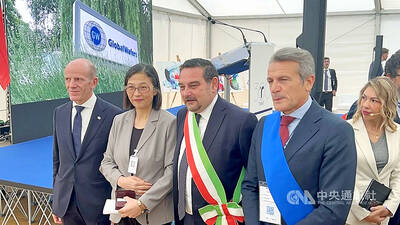Asian stocks fell for a fifth week, completing their longest losing streak in more than three years, on concern the US and Japan are sinking into recessions.
Mizuho Financial Group Inc led a decline among financial stocks after reporting losses from subprime-related investments. Sony Corp slumped after cutting its target for operating profit. Datang International Power Generation Co (
"The two scenarios confronting investors are either that Japan and the US only briefly slip into recession or that it will be long-lasting," said Masayuki Kubota, who helps oversee about US$1.7 billion at Daiwa SB Investments Ltd. in Tokyo.
The MSCI Asia Pacific Index fell 0.5 percent this week. The five-week, 7.1 percent retreat is the longest losing streak since August 2004. A half-percentage-point interest-rate cut by the US Federal Reserve on Wednesday to bolster growth wasn't enough to help the benchmark recover earlier losses.
China's CSI 300 Index plunged 10 percent, Asia's sharpest drop and its biggest weekly decline on record. Japan's Nikkei 225 Stock Average slipped 1 percent. Benchmarks fell elsewhere in the region, except Indonesia, Philippines, Thailand and Pakistan.
A measure of financial stocks on MSCI's Asian index dropped 2.3 percent.
TAIPEI
Taiwanese share prices on Friday closed 2.03 percent higher from Thursday, dealers said.
The weighted index closed up 152.86 points at 7,673.99 on turnover of NT$123.10 billion (US$3.85 billion).
Alex Huang (
TOKYO
Japanese share prices closed down 0.7 percent on Friday amid caution over key US jobs data and disappointing earnings news from companies including Sony Corp, dealers said.
The Tokyo Stock Exchange's benchmark Nikkei-225 index fell 95.31 points to 13,497.16. The broader TOPIX index of all first-section shares finished down 9.45 points, also a loss of 0.70 percent, at 1,336.86.
HONG KONG
Hong Kong share prices closed up 2.9 percent, dealers said.
The Hang Seng index closed up 667.84 points at 24,123.58.
Chinese financial markets will be closed from Wednesday until next Tuesday and the Hong Kong bourse will be shut Thursday and Friday next week for the Lunar New Year.
SYDNEY
Australian share prices closed up 3.4 percent, dealers said.
The benchmark S&P/ASX 200 gained 192.6 points to end at 5,842.9, while the broader All Ordinaries added 185.3 points to 5,882.3.
The S&P/ASX 200 dropped 10.9 percent and the All Ordinaries lost 11.3 percent last month.
SHANGHAI
Chinese share prices closed 1.43 percent lower, dealers said.
The benchmark Shanghai Composite index, which covers both A and B shares, closed down 62.63 points to 4,320.77.
The Shanghai A-share index fell 1.42 percent to 4,534.57.
The Shenzhen A-share index closed 2.84 percent lower at 1,339.46.
The Shanghai B-share index fell 2.22 percent to 295.81. The Shenzhen B-share index added 0.26 percent to 640.45.
SEOUL
South Korean share prices closed 0.6 percent higher, dealers said.
The KOSPI index gained 9.85 points to 1,634.53.
SINGAPORE
Singapore share prices closed 0.87 percent higher, dealers said.
The blue chip Straits Times index closed 26.05 points higher at 3,007.80.
BANGKOK
Thai share prices closed 3.40 percent higher, dealers said.
The Stock Exchange of Thailand (SET) composite index gained 26.63 points to 810.86 and the blue-chip SET-50 added 21.42 points to 588.59.
MUMBAI
Indian share prices closed up 3.31 percent, dealers said.
The benchmark 30-share SENSEX index rose 584.71 points to 18,233.42.

RECYCLE: Taiwan would aid manufacturers in refining rare earths from discarded appliances, which would fit the nation’s circular economy goals, minister Kung said Taiwan would work with the US and Japan on a proposed cooperation initiative in response to Beijing’s newly announced rare earth export curbs, Minister of Economic Affairs Kung Ming-hsin (龔明鑫) said yesterday. China last week announced new restrictions requiring companies to obtain export licenses if their products contain more than 0.1 percent of Chinese-origin rare earths by value. US Secretary of the Treasury Scott Bessent on Wednesday responded by saying that Beijing was “unreliable” in its rare earths exports, adding that the US would “neither be commanded, nor controlled” by China, several media outlets reported. Japanese Minister of Finance Katsunobu Kato yesterday also

‘DRAMATIC AND POSITIVE’: AI growth would be better than it previously forecast and would stay robust even if the Chinese market became inaccessible for customers, it said Taiwan Semiconductor Manufacturing Co (TSMC, 台積電) yesterday raised its full-year revenue growth outlook after posting record profit for last quarter, despite growing market concern about an artificial intelligence (AI) bubble. The company said it expects revenue to expand about 35 percent year-on-year, driven mainly by faster-than-expected demand for leading-edge chips for AI applications. The world’s biggest contract chipmaker in July projected that revenue this year would expand about 30 percent in US dollar terms. The company also slightly hiked its capital expenditure for this year to US$40 billion to US$42 billion, compared with US$38 billion to US$42 billion it set previously. “AI demand actually

Jensen Huang (黃仁勳), founder and CEO of US-based artificial intelligence chip designer Nvidia Corp and Taiwan Semiconductor Manufacturing Co (TSMC, 台積電) on Friday celebrated the first Nvidia Blackwell wafer produced on US soil. Huang visited TSMC’s advanced wafer fab in the US state of Arizona and joined the Taiwanese chipmaker’s executives to witness the efforts to “build the infrastructure that powers the world’s AI factories, right here in America,” Nvidia said in a statement. At the event, Huang joined Y.L. Wang (王英郎), vice president of operations at TSMC, in signing their names on the Blackwell wafer to

Taiwan-based GlobalWafers Co., the world’s third largest silicon wafer supplier, on Wednesday opened a 12-inch silicon wafer plant in Novara, northern Italy - the country’s most advanced silicon wafer facility to date. The new plant, coded “Fab300,” was launched by GlobalWafers’ Italian subsidiary MEMC Electronics Materials S.p.A at a ceremony attended by Taiwan’s representative to Italy Vincent Tsai (蔡允中), MEMC President Marco Sciamanna and Novara Mayor Alessandro Canelli. GlobalWafers Chairwoman Doris Hsu (徐秀蘭) said the investment marked a milestone in the company’s expansion in Europe, adding that the Novara plant will be powered entirely by renewable energy - a reflection of its